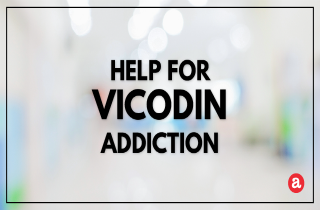Vicodin addiction help
Vicodin is a brand name blend of hydrocodone and acetaminophen. Like most opioids, Vicodin suppresses pain receptors in the brain while relaxing smooth muscle. But Vicodin can also trigger pleasant sensations in the pleasure center of the brain, leading to psychological dependence over time. So, if you or a loved one needs to treat Vicodin addiction, help is out there.
What are the exact ways to help treat Vicodin withdrawal syndrome and then psychological addiction? Can you help a Vicodin addict be successful in addiction recovery? Here, we explore the answers to those questions. Then, we invite you to ask any question you may have about help for Vicodin addiction at the bottom of the article.
How to help Vicodin addiction
There are many ways to help Vicodin addiction. However, the help that you choose will depend on the phase of Vicodin addiction treatment you are in. Vicodin addiction treatment generally follows the following course:
1. Withdrawal and detox from Vicodin – When you or someone you know is trying to quit Vicodin, first expect a period of drug withdrawal. During Vicodin withdrawal, medications and home treatments can help address withdrawal symptoms, especially if you decide to go cold turkey off Vicodin. Medications such as buprenorphine, methadone, and naloxone or nalterxone may be used in severe cases of drug dependence.
2. Physical stabilization – Long term or high dose use of Vicodin can result in protracted withdrawal symptoms (PAWS) after cessation of use. Vicodin PAWS can persist for the weeks or months after initial withdrawal and include trouble with sleeping, mood disorders like depression or anxiety, and underlying restlessness. Once initial withdrawal has been completed, be sure to also address and treat Vicodin PAWS.
3. Psychological help for Vicodin addiction – Physical aspects of detox support overall recovery from a Vicodin addiction. However, you also need to allow the psyche time to delve into the nature of addiction. Psychological treatment of the adverse psycho-emotional adaptations which lead to drug use is essential to helping Vicodin addiction.
Getting help for Vicodin addiction
Getting help for Vicodin addiction can be stressful. In fact, reaching out for help can bring up fear and anxiety, However, there are several places to get help for Vicodin addiction…and you don’t need to do it alone. Who can you go to get help for Vicodin addiction?
A prescribing doctor – If you are addicted to Vicodin and started with a prescription, your prescribing doctor can help you. Physicians can offer advice on tapering schedules, addiction treatment options, and may medically treat withdrawal symptoms. A prescribing doctor is a good place to start getting help for Vicodin addiction, as s/he can refer you to help outside the medical office.
Treatment centers – Paid rehab facilities and outpatient behavioral therapy programs can also work with you to address psychological triggers of addiction. Rehabs are mainly used so that you can have a “time out” from a crazy and stressful like to help you to regain a sense of control. The main benefit of a treatment center is to learn more about the nature of addiction, yourself, and how to cope with life better.
Treatment programs – Free addiction treatment programs exist to teach you how to help yourself treat Vicodin addiction. Good places to start are 12 step groups, SMART Recovery, or Rational Recovery. All are well-established addiction treatment programs which offer support groups and systems for living life without Vicodin.
How to help a Vicodin addict
Many Vicodin addicts cannot admit they have an addiction. The “denial” of a drug problem is common. One powerful way to help a Vicodin addict is to intervene WITH LOVE. You can either talk to a Vicodin addict informally, or call a formal intervention. Focus on the facts, the behaviors, changes, and adverse side effects you’ve observed. Talk about your feelings about their drug use and how it affects your personal relationship with the addict. Then, help your loved one find resources for professional Vicodin addiction treatment.
Sometimes, facing a Vicodin addict can be complicated by family dynamics. Addiction affects the whole family and there are usually underlying issues relating to the family when a person’s drug use is out of control. Family therapy or individual psychotherapy are also very effective ways to help a Vicodin addict. Family therapy can help set up clear boundaries and teach family members to avoid enabling the addict. Individual psychotherapy may also be useful. Address possible cross-generational use. Be sure that the people around the addict DO NOT enable addictive behaviors by either giving them money or helping to get drugs. If you feel you are an enabler or someone close to you is addicted to Vicodin, there are support groups available to you. Narc-Anon is a 12 step recovery for narcotics that aim to help the people around the addicts lives.
Vicodin Addiction help and helplines
There are support groups all over the country that work with prescription drug abuse and addiction. Narcotics Anonymous is a 12-step program for people who are addicted to narcotics. There are also non 12-step support groups out there which help with addition. Further, non-profits and religious communities can provide their our own support and therapy.
One standard hotline you can call for any referral service is 1-800-662-HELP to direct you to a Vicodin treatment service. You can also go online and do you own search by look up findtreatment [dot] samhasa [dot] gov. Here you can find exactly what you need to help the physical and psychological issues of Vicodin addiction.
Help with Vicodin addiction questions
Still have question about how to help Vicodin addiction? Maybe you have your experience about how to help Vicodin addiction you’d like to share? If so, please leave your questions and comments below and we will respond to your personally and promptly.









Related Posts